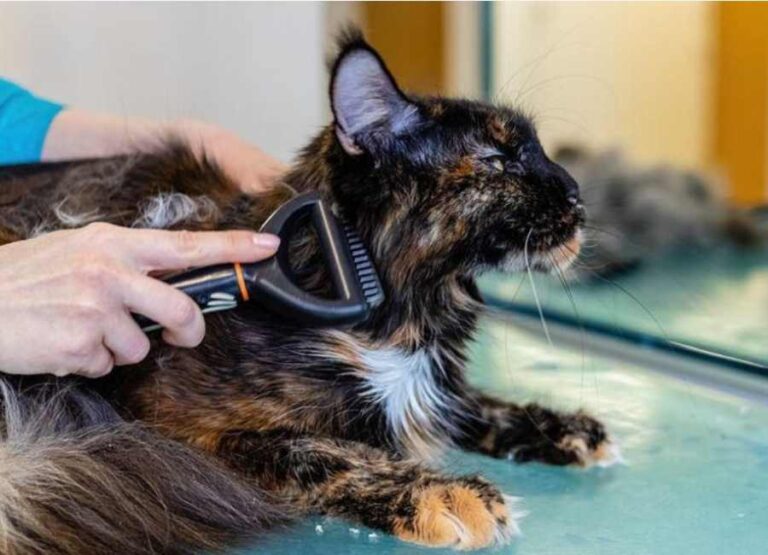Why Does My Cat Run Away From Me: 13 Top Reasons

Most cat owners always ask why does my cat run away from me and with my years of experience living with cats, I will be discussing some common reasons.
There are lots of reasons why your cat may be running away from you, but we will narrow it down to the most understandable reasons.
So keep reading…
Why Does My Cat Run Away From Me
Fear, reoccurrence of a traumatic event, anxiety, depression, curiosity, sudden changes in your mood, changes in socialization status, and changes in your personal lifestyle are the common reasons why your cat is running away from you.
When things around your house or home change this can spike fear in your cat and this can lead to your cat becoming afraid or unsure about you.
Now you understand there are many reasons your cat can become afraid of you and run away, let’s break it down further.
Here are the most common reasons why your cat is running away from you:
1. Reoccurrence of a traumatic event
Cats remember things a lot especially when an event leads to a traumatic experience.
This is common in cats adopted from a shelter home, believe me when I say if some event repeats itself it can trigger a shock in your cat.
This can cause your cat to run away from you, especially if the act or event is coming from you as their owner.
Let’s see an example…
If your cat had a traumatic experience from falling off a height and later recover from it.
When you play with your cat to a point that your cat tries to fall off from a height which is a repeat of the previous event.
Trust me your cat will keep a distance from you for a while because cats remember events.
2. You scared or shouted at them
When cats are scared they try to get away from whatever scares them very fast.
Your sudden changes in mood can scare your cat without you knowing and this can cause your cat to run away from you.
Shouting at your cat when they do something wrong is not the best way to make corrections as it can lead to your cat becoming scared of you.
So, avoid unnecessary behaviors or things that scare the shit out of your cat if you want them not to run away from you.
Here is a list of things that scare cats you should avoid.
3. You are having too many visitors
While we may be able to determine whether or not a stranger poses a threat, there are several indicators that should raise our suspicions.
Cats are significantly smaller than humans, therefore they have cause to be nervous.
They form bonds with their families because they know humans will supply them with food, water, shelter, and care, as well as not hurt them.
Many cats will be hesitant to trust strangers. They may not flee immediately, but many will come to a halt out of fear or concern.
Furthermore, some persons appear to be scarier than others. This might be due to posture, odor, or any number of other factors that only cats are aware of.
Some cats, like the others on our list for scaring cats, are quite sociable and will approach people without fear. These cats, we think, are in the minority.
A terrified cat is more likely to flee the house or to flee and die.
As a result, it’s critical to understand what scares cats which having too many visitors is one, and keep them away from your pets.
Changes in socialization status around your cat involve a lot of things.
Let’s discuss one example…
Assuming you socialized your cat with other cats and all of a sudden you bring in a new pet like an adopted dog.
For some time your cat will be running away from you and your new dog, however, this can be fixed.
5. Changes in your lifestyle
Again changes in your lifestyle involve a lot of things which can include changes in when you come home.
Let’s discuss an example…
You used to be a calm person all of a sudden you became a noisy person who plays loud music, this can negatively affect your cat and cause him to run away from you.
Another example is when you create a routine of coming home after 5 hours, all of a sudden you start to come home after 8 hours this can cause avoidable depression.
6. Your cat found a new home
The issue of finding a new home totally boils down to how you treat or care for your cat.
If this occurs to you, it might be distressing, but it’s not unheard of. A cat will occasionally visit a neighbor’s house for food and tickling before returning home.
They may also decide that they would want to live with someone else at other times.
When a cat finds someone that treats them better than you, they become scared of you and may start running away from you.
If you discover that your cat is spending time with someone else, the first thing you should do is try to convince them that your cat already has a loving home.
If your cat isn’t wearing a collar, it may be difficult for someone to reach you.
Using a GPS monitoring collar might help you figure out if your cat has a favorite spot where they might be enticed to relocate.
7. You had a new baby
Bringing a new baby home is a joyous occasion, but it may also be stressful for our feline companions.
Your cat may get agitated and anxious as a result of the substantial interruption in routine.
They could simply opt to go and seek out some peace and quiet for a day or two.
We understand that considering the best approach to prepare your cat for the new addition to the family is an extra item to add to the long list of things to do for new parents, but it’s a fantastic idea.
It’s a good idea to use a relaxing collar and pheromone diffuser immediately before your baby is delivered, as well as when they arrive home.
It’s a good idea to use a relaxing collar and pheromone diffuser just before your baby is born, as well as when you bring them home, to keep your cat quiet.
8. You move into a new environment
Moving to a new place may be stressful for cats, and it may take a long time for them to adjust to their new surroundings.
They could opt to return to the old house and live there!
If your cat lives outside, he or she will have spent a significant amount of time establishing and defending its area.
This is something kids will undoubtedly want to do again.
Keep your cat indoors for the first week or so following a major relocation. Before and after moving, you can use a pheromone diffuser to assist keep them quiet.
After you’ve relocated, don’t allow your cat out without supervision for the first time, since this may cause them to bolt.
9. Hormonal fluctuations
A female cat in heat will feel obliged to seek out a mate, whereas an unaltered male cat would scour the countryside in search of those females.
We recommend discussing with your veterinarian about neutering or spaying your cat from the kitten stages.
This will inhibit your cat’s hormones from causing him to venture far from home in search of a partner.
It will also eliminate the problem of unintended births and the need to find a home for kittens you weren’t expecting.
10. Stress
Another typical reason for cats to flee from you is stress. Cats are creatures of habit, and they despise changes in their environment or routine.
Moving furniture about, receiving a new pet or family member, house renovations, or simply loud noises can all trigger worry and anxiety in your cat, prompting them to seek sanctuary elsewhere.
11. Your cat may have a health issue
When cats flee, it’s usually because something is wrong with their health.
It might be anything as basic as a bladder infection or digestive problems.
They may even be sick with a cold and don’t want to be disturbed.
It’s not always simple to tell, but if your cat is used to you and begins fleeing, it’s typically a clue that there’s something more serious going on than simply your presence.
Cats who get frightened and flee whenever you greet them should be taken to the clinic as soon as possible to have their physical condition and behavior checked.
12. Your cat wants some privacy and space
New and experienced cat owners should remember that each cat is unique, and no two personalities are identical.
Cats are no different in this regard than people who can be classified as introverts, extroverts, or both.
Perhaps you aren’t paying enough attention to your cat and approach them at inopportune times.
If they’re busy or enjoying some alone time, give them some space and let them come to you instead of approaching them and frightening them away.
13. Curiosity factor
Cats frequently flee simply because they are curious creatures who enjoy exploring and following their interests.
In the summer, your cat could like chasing butterflies or insects, or they might have been distracted by a nice squirrel or a neighborhood youngster.
Your cat is prone to wander away from home for hours to days, especially if there is anything tempting nearby.
Even pleasant weather is enough to tempt them away from your lap in quest of adventure.
Read more: How to Get a Scared Cat Out Of Hidings: 6 Tricks That Works
What to do if your cat is running away from you
Here are some tips to help you deal with a cat running away from you:
- Find out the root cause and fix why your cat is running away from you.
- Desensitize your cat with its objects of fear.
- Provide a hiding or calming spot for the cat.
- Invest in anti-anxiety products (calming collar).
- Initiate your cat’s favorite activities or tricks.
- Start proper socialization.
- Offer high-quality treats to attract the cat.
- Redirecting and reconditioning your cat mindset is important.
- Let your cat be when your cat wants to be alone.
- Cat-proof your house to avoid your cat running away in the process.
- Talk to an animal behaviorist.

![Should I Get A Second Cat [12 Pros & Cons] Should I Get A Second Cat](https://petcreeks.com/wp-content/uploads/2023/04/Should-I-Get-A-Second-Cat-768x555.jpg)
![How To Know If Cat Has Parasites [9 Signs Explained] How To Know If Cat Has Parasites](https://petcreeks.com/wp-content/uploads/2023/04/How-To-Know-If-Cat-Has-Parasites-768x555.jpg)



